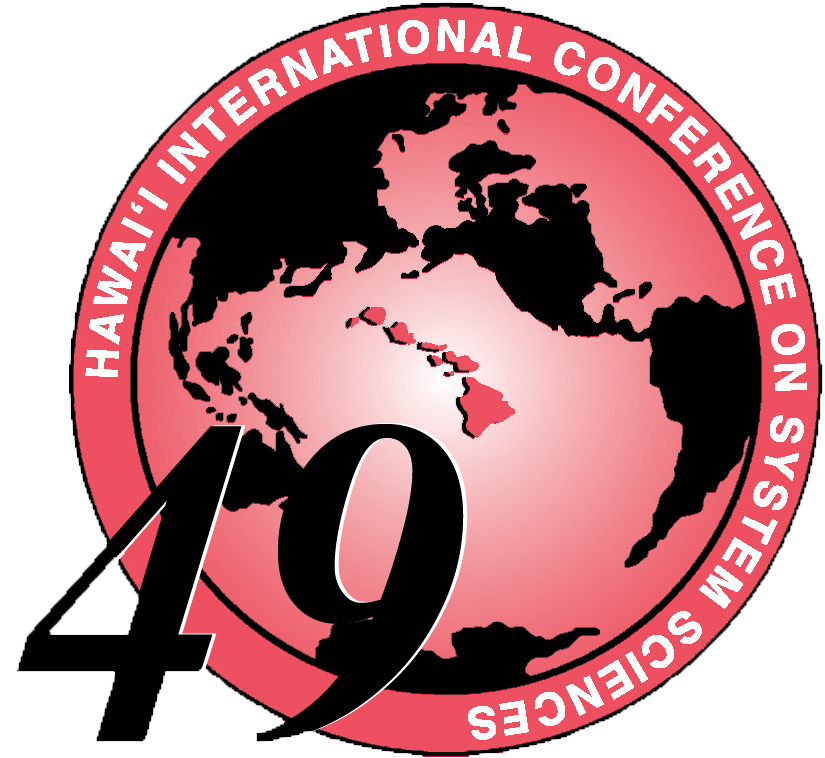HICSS - 49 E-Government Track
49th Hawaii International Conference on System Sciences
January 5-8, 2016 - Grand Hyatt, Kauai, HI, USA
Overview
Minitracks
Symposia and Workshops
Other Links
Emerging Topics in Electronic Government



The e-Government Emerging Topics minitrack provides a home for incubating new topics and trends in e-Government research. E-Government as an academic field is evolving; new directions of research and practice are emerging while others are becoming accepted as foundational. However, the foundations of the field still need to be spelled out more explicitly and rigorously. This HICSS E-Government Emerging Topics minitrack seeks submissions, in particular, that contribute to the evolution of e-Government research and to the clarification of the field or address novel issues, trends and uses of technology.
Submissions should speak specifically to how the research presented contributes to our understanding of this emerging field. Topics and research areas include but are not limited to:
- The conceptual and practice-based boundaries and foundations of the field of e- Government
- Agendas for e-Government research and research roadmaps
- Deep and innovative theoretical reflections about e-government
- Foundations and research methodologies for the study of e-Government
- The nature of inter- and multidisciplinary research designs in e-Government
- e-government education and competences
- ICT-enabled policy making and e-government policy
- Robotic technology in and for government
- ICT-enabled organizational forms/networked e-government
- New insights in Mobile to legacy/non-mobile application integration
- Mobility and e-government transformation: Challenges and opportunities
- Web 2.0/3.0 in government
- Sensor technology in government
- Data-and evidence driven public policy and decision making
- Archiving and Preservation of government records in digital form, in particular for small organizations
- IT, government, and an aging population
- Societal challenges and e-government, for instance, engaging citizens through technology
- Trust in and safe use of e-government
- Other topics as appropriate to the purposes of the minitrack
More information on the mini-track chairs:
Elin Wihlborg is in Political Science at the Department of Management at Linkoping University, Sweden. She holds a master degree in Gender Studies from LSE and a PhD in Science and Technology Studies from Linkoping University. She has a Marie Curie fellowship for research on sustainable e-government, 2011-14. Her research addresses challenges of e-governance and in particular public e-services towards: multi-level governments, identity and citizenship, trust and legitimacy. Her research interests and publications extend across the fields of e-government, sustainable development and public administration. She has published in journals like Public works and administration, International Journal of E-Government, Journal of Electronic Democracy and open government and Sustainable Development.
Theresa A. Pardo is the Director of the Center of Technology in Government at the University at Albany/SUNY. She is responsible for overall strategic management at the Center along with building and nurturing CTGs research programs, applied projects, and public-private-academic partnerships. Theresa is also an Associate Research Professor of Public Administration and Policy at the University at Albany. She is one of the developers of UAlbany's Government Information Strategy and Management curriculum in public administration. Theresa is also an active member of the digital government professional community serving regularly on national and international advisory committees, editorial boards, and conference committees.
Tino Schuppan is Professor for Public Management at the University of Labor Studies and the scientific director of the Institute for E-Government (IfG.CC) in Potsdam, Germany. He has research and consulting experience in the fields of e-government, public management reforms and development cooperation. Schuppan’s research interests include transformation in the context of e-government, changing work organization (“public management from below”), skills and competencies for e-government and ICT for development. Prof. Schuppan’s articles on public management and e-government have been published in leading international scientific journals, including Public Management Review and Government Information Quarterly and have been included in several books. He is a member of various international conference committees (for example the International Conference on Methodologies, Technologies and Tools enabling e- Government, TED Conference on E-Government in Poland, Fachtagung für Verwaltungsinformatik and Multikonferenz Wirtschaftsinformatik in Germany). He is co-chairing several international leading scientific conferences panels such as International Research Society for Public Management (IRSPM). As scientific director of the Institute for E-Government, Prof. Schuppan has carried out more than 50 national and international e-government projects, including projects in Africa, Latin America, Europe and Russia. He teaches in master courses at the University of Potsdam (Germany), University of Salzburg (Austria) and University of Bern (Switzerland).
Co-Chairs
Elin Wihlborg
(Primary Contact)
IEI –Department of Management
Linköping University
SE-581 83 Linköping
Sweden
Tel: +46-13-281578
Email: elin.wihlborg@liu.se
Theresa A. Pardo
Center for Technology in Government
University at Albany, SUNY
187 Wolf Road, Suite 301
Albany, NY 12205
Tel: +1-518-442-3892
Fax: +1-518-442-3886
Email: tpardo@ctg.albany.edu
Tino Schuppan
Hochschule der Bundesagentur für Arbeit
Campus Schwerin
Wismarsche Str. 405
D-19055 Schwerin
Germany
Tel: +49-331-7403-6761
Email: schuppan@ifg.cc
